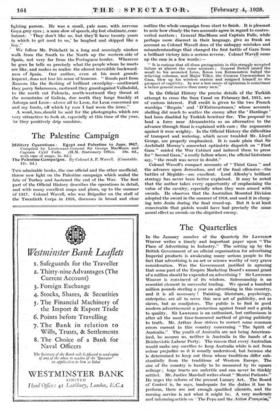The Palestine Campaign
Military Operations : Egypt and Palestine to June, 1917.
• Compiled by Lieutenant-General Sir George Maelltfunn and
Two admirable books, the one official and the other unofficial, throw new light on the Palestine campaign which sealed the fate of Turkey and hastened the end of the War. The first part of the Official History describes the operations in detail, and with many excellent maps and plans, up to the summer Of 1917. Colonel Wavell, who was Brigadier on the staff of the Twentieth Corps in 1918, discusses in broad and clear outline the whole campaign from start to finish.. It is pleasant to note how closely the two accounts agree in regard to contro- verted matters ; General MacMunn and Captain Falls, while perhaps more discreet in their language, give as frank an
account as Colonel Wavell does of the unhappy mistakes and misunderstandings that changed the first battle- of Gaza from a brilliant victory into a serious reverse: Colonel WaVell sums up the .case in a few words :- " It is curious that all three protagonists in this-struggle accepted failure at alinost the same moment ; General Dobell issued the recall -to his mounted force, Kress von Iiressenstein halted the relieving columns, and Major Tiller, the German Commandant in Gaza, blew up his wireless station and resigned hivagolt;to the . prospect of captivity. In war a last ounce of optiniism is sometimes a better general reserve than many men."
In the Official History the precise detaill Ot the Turkiih attempt to cross the Suez Canal on February .3rd, 1915, are of curious interest. Full credit is given to the two French warships Requin ' and ` D'Entrecasteaux,' whose accurate shelling did much to scatter the enemy after the Hardinge ' had been disabled by Turkish howitzer fire. The proposal to land a force near Alexandretta as an alternative to the advance through Sinai is explained with cafe ; the arguments against it were weighty. In the Official History the difficulties of transport and watering, which never troubled Mr. ,Lloyd George, are properly emphasized. It is made plain that Sir Archibald Murray's somewhat optimistic dispatch on " First Gaza " misled the War Cabinet and induced them to press for " Second Gaza," a costly failure where, the Official historians say, " the result was never in doubt." - Colonel Wavell's compact accounts of " Third Gaza ", and the advance upon Jerusalem, and of the final offensive—the battles of Megiddo—are excellent. Lord- Allenby's brilliant strategy has never been better explained. It may be noted that the author takes every opportunity of emphasizing the value of the cavalry, especially when they were armed with swords. He observes that the Australian Mounted Division adopted the sword in the summer of 1918, and used it in charg- ing into Jenin during the final round-up. But it is at least conceivable that pistols would have had precisely the same moral effect as swords on the dispirited enemy.






































 Previous page
Previous page